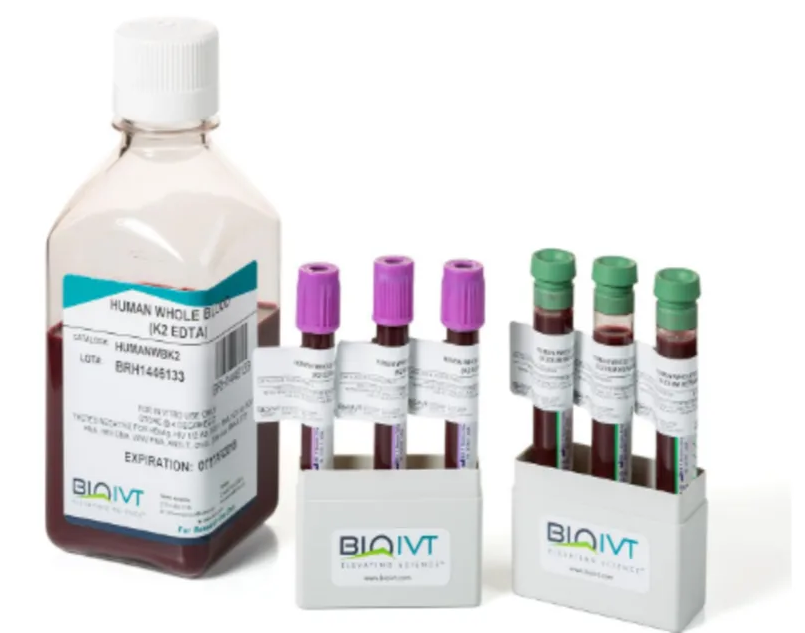When utilizing freshly obtained products, functional assays can be conducted without encountering issues associated with cell modification or activation caused by the freeze/thaw process.

Image Credit: BioIVT
Fresh cells and biospecimens offer stable components for numerous studies, including investigations into cell surface markers, cell activation states, and extracellular and intracellular molecules.
Some of the most common applications of fresh biospecimens are described below.
Fractionation
Processes involving whole blood processes, such as fractionation, are simpler and more viable when carried out soon after blood is drawn. If fractionation is conducted on blood samples that have been frozen, substantial quantities of circulating DNA and toxins will be present due to lysed cells and granulocytes.
Point-of-care device testing services
Point-of-Care (PoC) devices (for example, home pregnancy tests) allow end-users to conduct tests and obtain results without needing a laboratory. At BioIVT’s donor centers, your PoC devices can be tested with fresh blood, saliva, urine, and other specimens. This data can be shared with you afterward.
For this service, fresh products mimic the scenarios where the PoC devices will be utilized, providing accurate results.
Flow cytometry assays
Fresh blood proves advantageous in flow cytometry (FC) as the blood cells are more viable, enabling the capture of more cellular events. Specific cells, such as dendritic cells, do not freeze well. Therefore, if fresh blood is not utilized, it may result in an inability to detect these cells.
Functional cell-based assays
For functional assays, blood components like molecules and cells must be stable and active, necessitating the use of fresh blood. Fresh blood also facilitates the examination of microsomes and inflammasomes.
Challenges in isolating cell subsets
Functional cell-based assays require isolated cells and cell subsets. However, during the cell isolation process, numerous challenges may arise. This could result in low cell yields and poor downstream results.
These challenges stem from the isolation method used (such as the density gradient or magnetic system), cell lysis occurring in the isolation process, and the effects of the centrifuge device.
The time between blood collection and the isolation of cell subsets is also crucial. Over time, granulocytes can activate, leading to the alignment of the cell population with the peripheral blood mononuclear cell (PBMC) layer during density gradient isolations. For these reasons, having fresh blood is more beneficial.
The importance of fresh blood for cell-based assays
In studies investigating antibody functionality, along with the B cells responsible for antibody production, fresh materials are optimal. After thawing, B cells often rupture, making studying the genetic rearrangement of antibodies impossible. Like dendritic cells, B cells may not be preserved following the freeze/thaw process.
Neutrophil functional assays also necessitate fresh biospecimens. Neutrophils, the most abundant nucleated cells in a healthy human’s circulation, have a 16-24 hours lifespan once matured and in an inactivated state. While neutrophils are easily activated, this activation is typically lost during the freeze/thaw process.
If the cells are not fresh before isolation, cytokine secretion and natural killer (NK) cytotoxicity activity are prevalent. For investigations into neutrophil-related activities like migration, fresh blood is optimal.
Available fresh cells
With donor centers positioned globally, BioIVT can provide clients with fresh materials within hours of collection. This ensures that the products offered are suitable for a diverse array of applications, including:
- Neutrophil Activation Assays
- Neutrophil Migration Studies
- Monocyte Activation Tests
- Platelet and Coagulation Functional Assays
- Flow Cytometry Assays
- Cytokine and Chemokine Cell-Based Assays
- Cytokine and Chemokine Release Assays
- Interferon Gamma Release Studies
- ELISPOT Assays
The fresh products available from BioIVT’s donor centers include:

Image Credit: BioIVT
BioIVT also offers fresh processed products, including:

Image Credit: BioIVT
BioIVT offers various services, including cell-based assays and flow cytometry, to help advance your research.
About BioIVT
BioIVT, formerly BioreclamationIVT, is a leading global provider of high-quality biological specimens and value-added services. We specialize in control and disease state samples including human and animal tissues, cell products, blood and other biofluids. Our unmatched portfolio of clinical specimens directly supports precision medicine research and the effort to improve patient outcomes by coupling comprehensive clinical data with donor samples.
Our Research Services team works collaboratively with clients to provide in vitro hepatic modeling solutions. And as the world’s premier supplier of ADME-Tox model systems, including hepatocytes and subcellular fractions, BioIVT enables scientists to better understand the pharmacokinetics and drug metabolism of newly discovered compounds and the effects on disease processes. By combining our technical expertise, exceptional customer service, and unparalleled access to biological specimens, BioIVT serves the research community as a trusted partner in ELEVATING SCIENCE®.
Sponsored Content Policy: News-Medical.net publishes articles and related content that may be derived from sources where we have existing commercial relationships, provided such content adds value to the core editorial ethos of News-Medical.Net which is to educate and inform site visitors interested in medical research, science, medical devices and treatments.